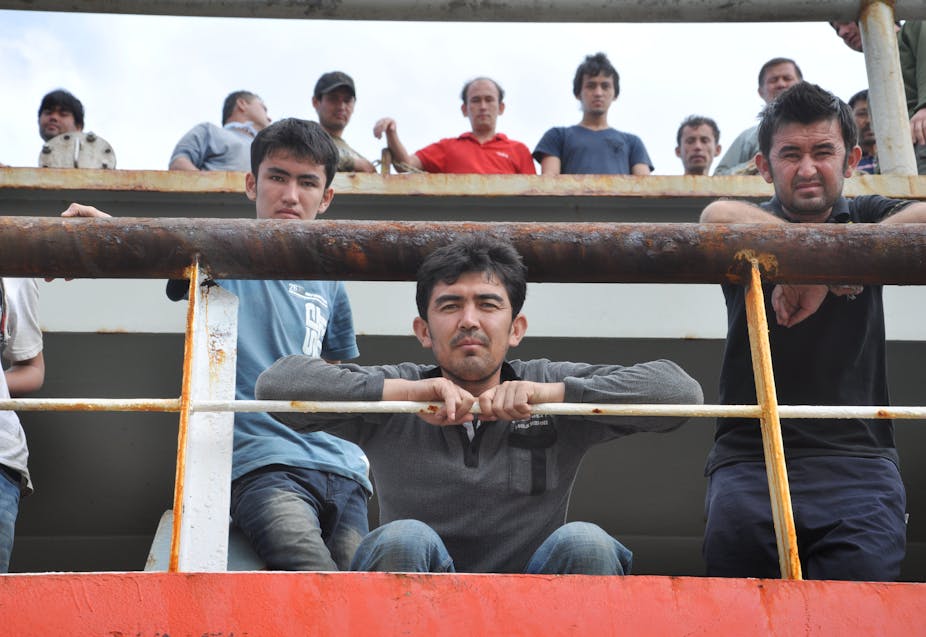If the lead stories in the digital and print media are anything to go by, Indonesians have little interest in the recent asylum seeker boat sinkings and the accompanying loss of life. Over the past couple of weeks, headlines have been dominated by on-going corruption scandals, violence in Papua, the Eurozone economic crisis – and of course the European Cup.
The sinking of another asylum seeker boat generally makes it to the middle of the paper or the news bulletin, along with other not-so-important international news. A recent cover story in Tempo news magazine, “Swimming with Sharks. On the Trail of People Smugglers” is the exception proving the rule.
To the extent that there has been coverage of the most recent tragedy, much of it has focused on the goings-on in Australian federal parliament. Indonesians are used to seeing their politicians acting primarily in their own political self-interest rather than in the interests of the nation. I get the impression at least some Indonesians take comfort from the fact that theirs are obviously not the only ones to act like this.
Certainly the ways in which many Australian politicians have been handling this issue has done nothing to commend our system of government to Indonesians.
But why is so little attention paid in Indonesia to tragic events such as we have seen in the past two weeks?
Among the country’s political leaders, there is a sense that Indonesia has done as much as could reasonably be expected of it to prevent asylum seekers setting off for Australia – and perhaps more. They point to the fact, for instance, that as recently as 3 June this year, the Indonesian navy intercepted a boat carrying 59 asylum-seekers from the Middle East and headed for Australia, off the eastern Indonesian island of Sumba.
Further, the President, Susilo Bambang Yudhoyono (SBY), commenting on the sinking, said that he had been in touch with Prime Minister Gillard, and that Indonesia was following the protocols agreed as part of the so-called Bali Process.
SBY and Gillard met in Darwin for the Second Australia Indonesian Leaders Meeting on 2-3 July. Australian observers seem to assume the boat sinking would be high on the agenda. Not so in Indonesia.
The Jakarta Post reported SBY’s foreign affairs spokesperson as saying that the issue might be discussed at the Darwin meeting, “although it was not on the agenda”.
Among the Indonesian political public, and many politicians too, this lack of interest is also an example of the “it’s not my problem” syndrome. Across the board in Indonesia, there is a widely held view that the country is paying the price for a problem not of its own making. Australia is held to be the more responsible party.
SBY’s foreign affairs spokesman, for instance, was quoted by the BBC’s Indonesian service on 1 July as saying that handling of the refugee issue was a matter for the Australian government.
Some make the argument that the asylum seekers from Afghanistan and Iraq would not be coming, at least not in such numbers, if western countries had not invaded their homelands. And of course Australia was one of those countries.
We should not underestimate the extent to which Indonesians from right across the religious and political spectrum reject Washington and Canberra’s justifications for these military interventions.
Others simply take the view that these deaths have occurred outside Indonesian territory, by people heading for Australia – thus: “it’s not my problem”.
There is little sympathy for asylum seekers in Indonesia, even by the relatively low standards set by Australia. From popular conversation up to national political debate, the term “asylum seeker” is almost never used. Even among those who ought – and probably do – know better, the term “illegal migrant” is favoured.
There’s a pragmatic factor at work here too, at least so far as media coverage is concerned. No Indonesian news organisation has a full-time journalist based in Australia. The best that most organisations can do is to use the services of stringers.
The result is that most news about events concerning Australia, including the sinking of asylum seeker boats, is sourced from organisations such as AAP and the BBC which, not surprisingly, do not put a spin on the story to make it of interest to Indonesian viewers or readers.
For many in Indonesia, Australia is best known as the country where drug smugglers come from. The recent debate over the remission granted to Schapelle Corby illustrates this. And some here have begun to ask: which is more dangerous to the community – smuggled people or smuggled drugs?

